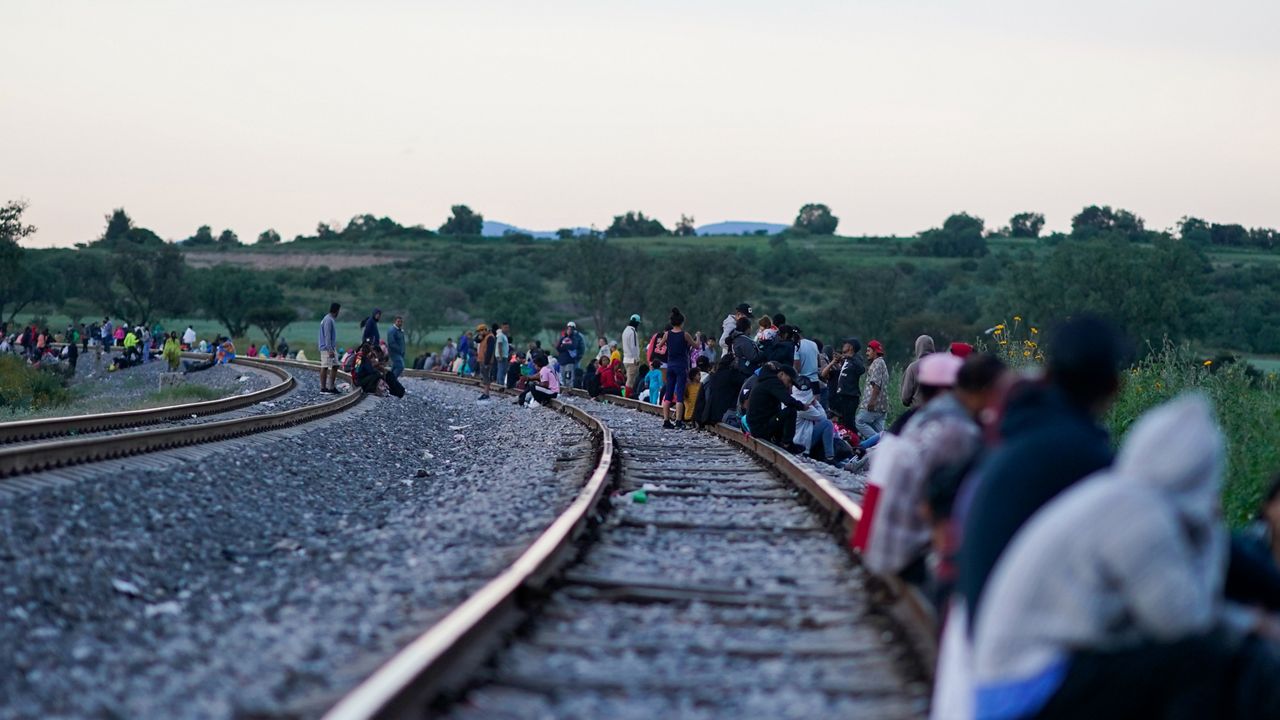HUEHUETOCA, Mexico — A Mexican railway operator announced Tuesday it is temporarily suspending train runs in the northern part of the country because so many migrants are climbing aboard freight cars and getting hurt in the process.
What You Need To Know
- A Mexican railway operator, Ferromex, temporarily suspends 60 trains ran in the northern part of the country because so many migrants are climbing aboard freight cars and getting hurt
- Ferromex said it was stopping trains “to protect the physical safety of the migrants,” but the word had yet to trickle down to the migrants as hundreds waited in Huehuetoca
- Migrants have long used the trains, known collectively as “The Beast," to hitch rides from as far south as Oaxaca state to the U.S. border
- Ferromex is Mexico's largest concessionary rail operator and the impact of the train stoppage will be “very important”
Ferromex said it has temporarily ordered a halt to 60 trains carrying cargo that would fill 1,800 tractor trailers. It said some international trade would be affected by the stoppage.
In recent days, there have been about a "half-dozen regrettable cases of injuries or deaths” among migrants hopping freight cars, the company said in a statement.
The company, owned by conglomerate Grupo Mexico, said some migrants even hopped on moving freight cars “despite the grave danger that represents.”
“There has been a significant increase in the number of migrants in recent days,” Ferromex said in the statement, adding that it was stopping the trains “to protect the physical safety of the migrants,” while it awaited action by authorities to solve the problem.
But the word had yet to trickle down to the migrants themselves, hundreds of whom waited on the tracks and alongside them at a railway yard in Huehuetoca, on the northern outskirts of Mexico City.
Pavel Aguilar Flores, a migrant from Venezuela, was hoping to hop a freight train to Matamoros, a dangerous Mexican border city across from Brownsville, Texas.
“We haven't heard any news,” Aguilar Flores said. “We are going to continue on our journey, and in fact we're waiting for a train.”
“I have heard there have been accidents, but not so many as people say,” he said. “You have to be careful and get on the train when it's stopped, not when it's moving.”
In fact, trains were still running through the railyard at Huehuetoca Tuesday evening, but they weren't heading where the migrants wanted to go.
According to Ferromex, the worst problems appeared to be further north.
The company said there were about 1,500 people gathered at a rail yard in the city of Torreon, in the northern border state of Coahuila. The company also reported about 800 migrants waiting at the freight yards in Irapuato, in the north-central state of Guanajuato.
About 1,000 people were reported to be riding freight cars on the train line that connects the city of Chihuahua and the northern border city of Ciudad Juarez.
Ferromex is Mexico's largest concessionary rail operator and the impact of the train stoppage will be “very important,” said Ana Bertha Gutiérrez, the international trade coordinator for the Mexican Institute for Competitiveness.
She noted the measure could hit industrial states like Nuevo Leon, Baja California and Chihuahua hard, given their links to the U.S. market.
Migrants have long used the trains, known collectively as “The Beast," to hitch rides from as far south as Oaxaca state to the U.S. border. About a decade ago, the Mexican government briefly staged raids on the trains to discourage the practice, but later largely abandoned the effort.
The announcement comes as migrants are increasingly desperate to reach the U.S. border.
On Monday, migrants mostly from Haiti burst into an asylum office in southern Mexico city of Tapachula.
Throngs of migrants knocked over metal barricades and pushed past National Guard officers and police stationed at the office. Some of the migrants were trampled by their colleagues in the rush.
Authorities later convinced many to leave, and no injuries were reported.
Crowds of frustrated migrants, including many from Cuba and Honduras, say they have had to wait for weeks in some cases for an appointment at the office in Tapachula, near the border with Guatemala.
At the office, run by the Mexican Commission for Refugee Aid, migrants can file claims for asylum in Mexico. Most, however, intend to use the papers to travel more safely and easily to the U.S. border.
Mexico is on track to receive more asylum applications this year than ever before as the flow of migrants threatens to overwhelm governments of several Latin American countries along the migratory route.
Andrés Ramírez Silva, the director of Mexico’s refugee agency, said last week that the number of asylum applications his agency receives this year could reach 150,000, well above the 129,000 record set in 2021.



